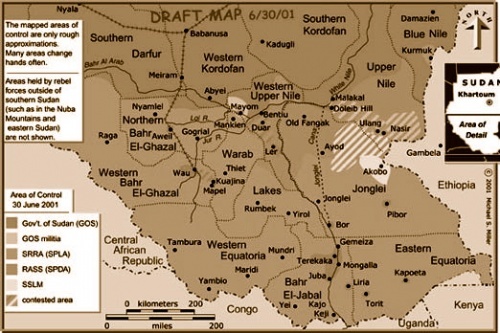
The current wave of fighting between the Lou Nuer and Murle will be subject of UN Security Council discussion later today (January 5, 2012). The situation is extreme both from conflict and humanitarian perspectives as UN aid agencies put out an SOS. Few though have even heard of the towns, regions and peoples involved much less having good information on the current situation or recent past which also involves the Dinka tribe. Perhaps 1,500 people have been killed just in the most recent round of attacks according to Bill Andress, Sudan Advocacy Action Forum, Trinity Sudan Ministry, and Bill has already provided insight in previous post at -
diplomaticallyincorrect.org/films/blog_posts
Below is Bill Andress’ follow-up:
“Here is a bit of my thought about the causes of the conflict; this is an extract from followup to conversations with some Lou Nuer who live in the U.S./Canada and are interested in peacebuilding although they attribute the problems to the Murle. I agree with you that tribalism is a major element of the problems, which I consider a parallel to the racism of the Government of Sudan.
I think it is not reasonable for the Nuer to lay the blame for this attack on the Murle. The fighting has been ongoing for so long that it is not possible to know with any accuracy who started it. Certainly it is true that the Murle attacked the Lou Nuer in August and caused extensive theft of cattle, death and destruction. In 2009 the Nuer destroyed Lekwangole and killed about 1200 Murle people. The cycle of violence must stop, and I think both groups share blame. I do not think that trying to blame one or the other will lead to peace, which of course is the objective.
In any event, I think that a major effort is needed to identify and correct the continuing causes of conflict. Over the past few years, I have come to believe that among the causes are the following. I am sure that I have missed some important causes, but these are the ones that come to mind.
1. Politicians inciting violence for their own political gain.
2. Failure of the government to demonstrate resolve in stopping the violence.
3. Failure of the government to be inclusive and bring all groups into decision making.
4. Erosion of the tribal, civic, military, family and church leadership over the past two decades.
5. The concept of a bride price and the rising price that must be paid.
6. The failure to reduce or eliminate weapons held by all the tribal groups.
7. The failure of the SPLA to protect people.
8. Poverty and unemployment especially among the youth who are unable to see a better future. Thus they quickly resort to violence and theft.
9. The failure of Jesus's Church (not any single denomination - but we the people of God) to reach the young people in the cattle camps with Christ, redemption and reconciliation.
10. Discrimination against women who often are the pathways to peace.
11. Tribalism, which is similar to racism, and results in unwarranted hatred, fear, and conflict.
A comprehensive strategy that incorporates all the organizations and personalities that are necessary to solve these problems, and any other that I missed, is needed.
From time to time, groups have assembled to work on developing a plan to deal with this conflict. No plan has been implemented to a degree such that it has made a long term difference. RECONCILE is the most capable and most widely respected peace building organization in South Sudan. While they do not have the resources to independently create and execute such a plan, they have access to church, government and other resources and have the capacity to build and execute such a plan if they have proper resources and cooperation.
Please give this list some thought and let me know what changes are needed.
------------------------
The issues listing is not in priority order but reflects the order in which the problems came to mind. I do not propose that this is THE list because I am an observer from a different culture and 7,000 miles away. Instead I propose it as a starting point for people to critique and improve.
I will propose an e-mail group to develop a real list, develop a plan of correction and then meet to finalize it. Then it would be presented to those who have the power and resources to implement. I consider this totally a beginning, the front end of a potential path, a flawed "straw man" and am willing to be turned away by a better idea. Both of the Nuer accepted it as is, which is a bit disappointing because I think it means that they did not give it much thought. Ultimately it must not be "my" idea or "my" program. Somewhere along the line, it must become Sudanese.
I am happy to be a resource for you concerning things Sudan. Our element of the Act for Sudan umbrella group has been working for a "just and lasting peace for all the people of Sudan/South Sudan" for about 12 years. We have very strong relations with the church leadership in both Sudan and South Sudan. My personal knowledge of the South is greater than of the North because I have not traveled in the North except to Port Sudan while I visit South Sudan almost annually.
In His Service,
Bill
Bill Andress
Sudan Advocacy Action Forum
Trinity Sudan Ministry
Live honorably, love generously, and serve graciously"
---END
See Diplomatically Incorrect Latest Article – “Ethnic Killing Unabated in South Sudan”
diplomaticallyincorrect.org/films/blog_post/ethnic-killing-unabated-in-south-sudan-by-ambassador-mo/43349
Contact/Follow Diplomatically Incorrect at:
Facebook Become a Fan at “Diplomatically Incorrect”
Twitter – Follow at DiplomaticallyX
Related Reports – “War Crimes Justice” Channel -
diplomaticallyincorrect.org/c/war-crimes-justice

